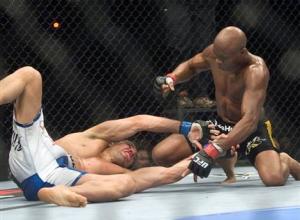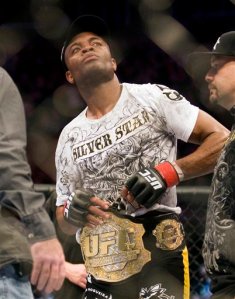Unless you’ve been living under a rock during the past decade, any sports fan knows that Mixed Martial Arts has shifted from a fringe interest unfairly perceived as “human cockfighting” in the 90s, to an industry giant with tons of television exposure, and huge Pay Per View buyrates.
The UFC has done a great job of shifting their product into something adaptable to the mainstream, thanks in part to smart marketing, but also to changing the rules (timed rounds, weight classes, etc.) to make the sport more professional. And while I’m sure the hardcore MMA forum dwellers might disagree, from my vantage point, UFC President Dana White does a good job of signing fighters who will put on a good show.
Which brings us to UFC 97. The event took place this past Saturday, with a main event featuring dominant middleweight champion Anderson “The Spider” Silva looking to defend his title for a record ninth time against Thales Leites. Silva has a solid all-around game but is known best for his striking, while Leites’ strength is his Jiu-Jitsu. These kinds of “striker vs. submission specialist” matches have generally sparked some level of interest among fans and have been entertaining, but that was not the case on Saturday.
 If MMA is like a game of chess, then Silva and Leites reached a strategic stalemate, one that was boring and understandably frustrating for those in attendance, and those who paid for the Pay Per View. Leites had no desire to take on Silva in a striking match, and frequently went to the ground to avoid getting hit. Understandably, Silva wanted no part of following Leites to the floor (which would have resulted in a Jiu-Jitsu contest), and thus the main event had very little action to write home about. Leites didn’t try very hard to engage Silva, who won via unanimous decision as the crowd booed. The fans at home showed the same level of discontent, complaining about the fight on MMA message boards.
If MMA is like a game of chess, then Silva and Leites reached a strategic stalemate, one that was boring and understandably frustrating for those in attendance, and those who paid for the Pay Per View. Leites had no desire to take on Silva in a striking match, and frequently went to the ground to avoid getting hit. Understandably, Silva wanted no part of following Leites to the floor (which would have resulted in a Jiu-Jitsu contest), and thus the main event had very little action to write home about. Leites didn’t try very hard to engage Silva, who won via unanimous decision as the crowd booed. The fans at home showed the same level of discontent, complaining about the fight on MMA message boards.

To his credit, UFC President Dana White came out, and admitted it was a poor main event. “I can honestly tell you that I’ve never put on an event that I was embarrassed to be at until tonight. I want to publicly apologize to all the fans. I apologize. I personally apologize for what happened tonight. You guys know, this isn’t what the UFC was built on and this isn’t the way the fights usually go. Listen, any night you can have an off-night. When a guy is that talented and can literally end a fight whenever he wants to, wow. We’ve got to do something. Watching that was hard. That was tough to take. It was embarrassing, honestly. It was really and truly embarrassing.”
Before you can start to wonder how to prevent this sort of boring main event in the future, the first question needs to be asked: is MMA entertainment or competition? Obviously it’s a mix of the two, but finding a balance can be difficult. On a strategic level, Silva didn’t necessarily do anything “wrong”. He realized Leites wanted no part of engaging him, so he adapted his gameplan appropriately to ensure a win. Critics, reasonably, will say that we paid good money to see a fight, and we didn’t get it. But if Silva’s job is to win, and defend his title, it’s difficult to fault him for not risking that goal and his career in order to make the fans happier.

Generally, the result of this kind of fight is that the guilty party doesn’t get another high profile match for a while. One would think that when Dana White said, “We’ve got to do something”, he meant that Leites was given the biggest fight of his life, and didn’t “challenge” much at all as the challenger. So it would be easy enough to remedy the problem by pushing Leites down the card as punishment, until he puts together decisive wins and makes amends with the fans.
That being said, I think it would serve the UFC well to look at the inherent goals of the athletes in these fights, how they conflict with the entertainment aspect of the sport, and figure out a way to better punish inactivity. For example, UFC’s Japanese counterpart Pride FC (since purchased by UFC and discontinued) had a warning card system. If a fighter showed a lack of activity, it was at the referee’s discretion to pull out a card (much like in soccer), which would deduct 10% of the fighter’s purse for the night. Multiple cards could be pulled, and three would result in a disqualification.
I can’t think of a better way to give the fighters incentive to, well, fight. If fans are paying big money for their ticket, and those at home are paying money for the Pay Per View, why not give the athletes a financial stake in making it exciting too? Granted, this concept may not go over as well in America compared to Japan, where we have different perspectives on competition, honor, money and so on.
If you were in charge of the UFC, what would you do to “fix it”? Is there something beyond penalty cards that can ensure fans get their money’s worth? Or is it simply the responsibility of the promoter to put together the most entertaining fights possible? Should we even be bothering with trying to make MMA more “entertaining”, or does that mentality do a disservice to the competitive aspect of the sport? I’m interested to hear your thoughts.







